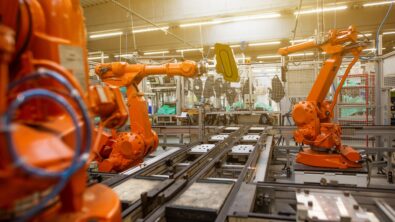Providing online engineering learning opportunities for students

Education takes on many forms via academic institutions in the classroom and online training, along with other traditional methods to enrich the student to learn skills for assisting them in real-world application.
However, some conventional approaches to academic learning are moving outside the classroom via mass customization through online content across several disciplines and tools. Companies like Siemens are working in conjunction with academic institutions to create this new structural concept to help students develop greater knowledge in the venue of engineering.
Engineering is an innovative industry that is witnessing continual technological advancements, requiring students to be even more adept at acclimating themselves to this dynamic landscape. Finding the appropriate methods for educating, mentoring and preparing for this field of learning is crucial to a student’s success.
The following transcript displays our last excerpt from the original podcast about this compelling topic from, Alex Allison, Enterprise Account Orchestrator, interviewing Dora Smith, Senior Director of Global Academic Partner Programs at Siemens Industrial Software as they discuss these academic concepts and trends:
Alex: Could you give us a feel for how Siemens is viewing academic challenges and their active role in bridging this gap?
Dora: There’s two key areas we’ve made investments in the last two years, and that is around curriculum. We’ve done this multidisciplinary approach that an educator can just take out of the box and upgrade their curriculum. We’ve done things in some hotter topics, so there’s additive manufacturing curriculum available for some me of those type of topics. Secondarily, we’ve been making quite a bit of investment in the competition.
So, there’s always been some level of real world competitions. In the past they were heavily automotive, and we’re starting to see other industries, like aerospace, and much in robotics. We’re trying to directly support those as much as we can globally, because that is where students get the extra, experiential learning. Curriculum and competitions are the two significant areas where we’ve made investments. Our USA colleagues developed an apprenticeship playbook, which helps the industry understand ‘how do I set up an apprentice program like I’ve heard at Siemens and other German manufacturers’ and roll that out.
We’re also expanding in the U.S. in about nine states, so our apprenticeship program is growing. This is a resource that helps educate a company on what it can do. We also look for opportunities where we meet with a customer, working directly with the school to help them evolve. Whenever we can create that kind of three-pronged partnership of people using our technology, the vendor, and the technology provider at the school, we see things change more quickly in an educational environment.
Siemens, beyond our software, possesses much hardware in other divisions of Siemens and we’ve brought those two together in several industry 4.0 or digital labs. You can see that in India, China and Australia. Also, we beginning to see some of these in the U.S. with expansion of those in areas of Europe. So, the ability for us at Siemens to help in consulting a school, not merely on the digital software side of things, but on into the manufacturing, even into the PLC side of how you code the machines to get things manufactured, gives us a holistic package of what we can bring to the educational space.
Alex: That’s interesting. The whole idea of modern apprenticeships is curious in understanding if that’s still attractive for millennial’s coming out of school, because many times that is extracurricular. You’ve got to do that at a summer or at a term. I was wondering if that was actually now getting baked into the curriculum, where to earn your degree or your advanced degree, you now have to do required stints of apprenticeship or maybe a formal program or mentoring program. This is something that is gaining traction and working that both the students were interested in and it was providing value to the industry.
Dora: Yes, and I think we’re starting to see more schools give credits so that it is more baked in and not extracurricular. In some countries, or particularly zones across Europe, it’s always been that way. There’s always been an apprentice piece, an applied piece that was baked into program where you go to school for a semester and then you’re working another semester. Or, it could be half-on, half off, where you’re going for three days of the week at a school and then two days for the applied part. So, I think we will be much better off where we make this happen globally.
Alex: So, I believe everyone should always be learning something. A question I always love asking folks is what books are you currently reading? You seem like a very naturally inquisitive person, so this question should be perfect for you. I’m curious to pick your brain on what book you’re currently reading and then you can segue that into where can our listeners can go to learn more and get involved in taking on some of these challenges head on?
Dora: Siemens as a company sent out this digital readiness checklist where you answer a series of questions across different digital domains, and then based on those answers, it curated a bunch of content, much of it external to Siemens on different courses or YouTube videos or TEDx type talks that you can take. And, several of the deans asked me afterwards, could you please send us that? So, they can go through it and may want to recommend it to students. That’s one that I’ve taken a number of courses and reading materials that were recommended through the digital readiness checklist. Work-wise, one that I finished not too long ago that was interesting was one called, Disrupting Class, focusing on this idea of disruptive innovation to education. The idea of much more student-centric or individualized learning.
Think about the educator being more on the side in the classroom and the student self-teaching through online learning and leveraging the professor as a mentor, even to the idea of mass customization for academia. Disrupting Class is one I’d recommend. Another one that’s interesting, we’ve been focusing on as we’ve merged with Mentor Graphics, a company that is our same size, is The Speed of Trust. We’ve been working through that in my team where we look at each of these trust behaviors in our team meetings. However, it’s really about how you strengthen yourself and/or your team. Your credibility through two areas: one being competence, which is what you would do in regular ongoing learning opportunities, and secondly in character, and looking for ways that, especially in a team dynamic, you’re building up that character connection.
Alex: I must up my reading game. It was wonderful to hear your thoughts on rethinking education to solve this skills gap and how we can really all play a role in some of the various solutions you’ve put forth today. This is Alex Allison and thanks for listening. So long.
With over 170,000 commercial customers globally, Siemens Digital Industries is empowering the next generation of engineering talent with the necessary tools, skills, knowledge and education for this dynamic, innovative industry. The academic partner ecosystem enables more than one million future engineers and technologists at academic institutions worldwide.
Listen to the full podcast on SoundCloud or read and listen to the overview blog and podcast on this topic.
This concludes our fourth and final blog in this series on the Siemens Academic Program.
About the authors:
Dora Smith is the senior director of the global academic program for Siemens Digital Industries Software. The program empowers the next generation of digital talent through project-based learning, STEM competitions, and industrial-strength software and curriculum to support students and academic institutions worldwide.
Alex Allison is an account orchestrator with Siemens Digital Industries Software and has been with the company since 2013. In his current role, he is responsible for maintaining relationships with electronics and high-tech companies on the Eastern seaboard. Alex began his career in the semiconductor industry, specializing in manufacturing systems. He has experience around OCM, managing complex enterprise system architecture, and ensuring customers have the right solutions and processes that will result in transformational efficiencies throughout their business.


